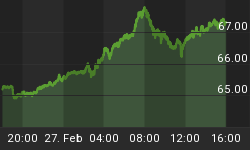Based on the May 11th, 2012 Premium Update. Visit our archives for more gold & silver analysis.
So far, 10 European political leaders out of 17 have been ousted out of office like a falling dominos in a little more than a year.
The issue that has angered voters other than unemployment is austerity. We know from personal finances that when we overspend, we must cut back, pay our debts and rebuild our savings. That's the prudent thing to do and that's what the austerity school preaches. But what happens if the financial hole is so deep that there is no way to climb out by reasonable cutting back and saving? That's when you declare bankruptcy and your creditors share the pain. The laws of capitalism decree that if you don't assess risk correctly, you lose money. The conclusion is that austerity has to come with a mechanism for default, which is not the case in Europe.
The growth club, represented eloquently by New York Times columnist and Nobel Prize winner Paul Krugman, believe that borrowing and spending will spur growth and consumption and that austerity will begat only more austerity. In other words, the European Central Bank (ECB) should print money and then Greece and the others can service their debts with cheaper euros due to the inflation caused by money printing. Is this not a kind of default, since you are paying back your debts with devalued money?
We believe that the massive printing of euros will eventually take place and please keep in mind that unlike Fed, EBC has still room to lower its main interest rate. Once markets believe that this is the likely (or even inevitable) outcome, the gold price will soar not only in terms of euros but also in terms of other currencies.
The ECB recently lent money at concessionary rates to European banks in an effort to co-opt these nearly bankrupt institutions into financing the nearly bankrupt European sovereigns. They offered loans against dubious collateral, to tempt commercial lenders to play the "carry" game, namely, buying Spanish and Italian debt of varying maturities yielding up to 7% while paying a mere 1% for a three year loan. The prospect of a devastating run on banks was avoided, for now.
We wonder if this is not pushing the can down the road.
There are certain things that look to be almost inevitable. The eurozone is in trouble, in particular Spain, Portugal and Italy. (We don't even talk about Greece, that country is already just about bankrupt in more ways than one.) The longer this crisis will take to play out the deeper it will get with more countries caught in the net, with Belgium, France and Netherlands not far behind. The proportion of young people between the ages of 15 and 25 who are now without a job is 51 per cent in Greece and Spain, 36 per cent in Portugal and Italy and 30 per cent in Ireland. In France "only" one in five young people are out of work.
History has shown over and over again that when there are deep economic problems, the monsters that lurk in dark, dank corners come out brazenly into daylight looking for victims or scapegoats. It wasn't so long ago when this is precisely what happened in Europe. This week in Greece a Neo Nazi party took 21 out of 300 seats and 7% of the popular vote - the first neo-Nazi party to enter a European assembly since the Second World War. This is enough to give us shivers. The center seems to be falling apart and the extremes of left and right are gaining power.
Even Somali pirates preying on merchants ships are having a hard time due to the economic downturn. On the one hand, things couldn't be better for them. Shipping companies have reduced ship speeds through the highest-risk area to save on fuel, making the ships easier targets. But the companies have switched to relying on guards, rather than speed, for protection, which will make for shoot outs on the high seas. The math is simple. A single day at lower speeds can save $50,000 in fuel at current prices - enough to pay the guards for the entire journey.
The image reminds us of Europe, a cumbersome ship overgrown with barnacles, trying to make its way in pirate-infested waters. Instead of finding a solution to the problem, and perhaps there is no simple or fast solution, European leaders keep finding stop-gap, make-do, arrangements. So, do you put on speed with the hope of creating jobs and growth and outrunning the pirates, or do you cut back and hire armed guards?
So why do we focus on these political and economic factors that much? Well, we do feel that there is a need to separate short-term turmoil from the long-term fundamental picture. Markets are intrinsically emotional and prone to a sudden change of mood. Sometimes even seemingly unimportant events can spark an abrupt move, yet in the long term the fundamentals make the decisive impact. And these are indeed favorable for gold and the whole precious metals sector.
To make sure that you are notified once the new features are implemented, and get immediate access to my free thoughts on the market, including information not available publicly, we urge you to sign up for our free e-mail list. Gold & Silver Investors should definitely join us today and additionally get free, 7-day access to the Premium Sections on our website, including valuable tools and unique charts. It's free and you may unsubscribe at any time.
Thank you for reading. Have a great and profitable week!















